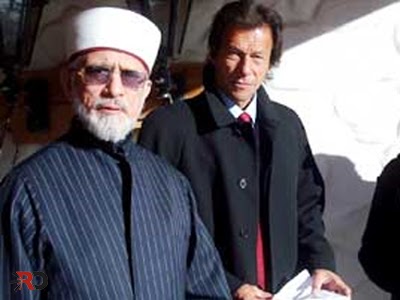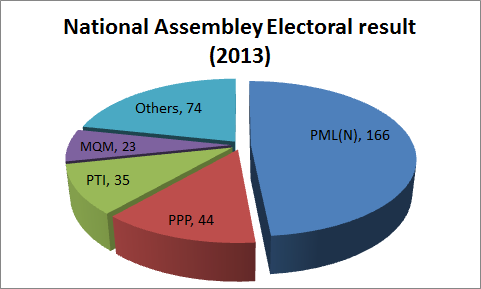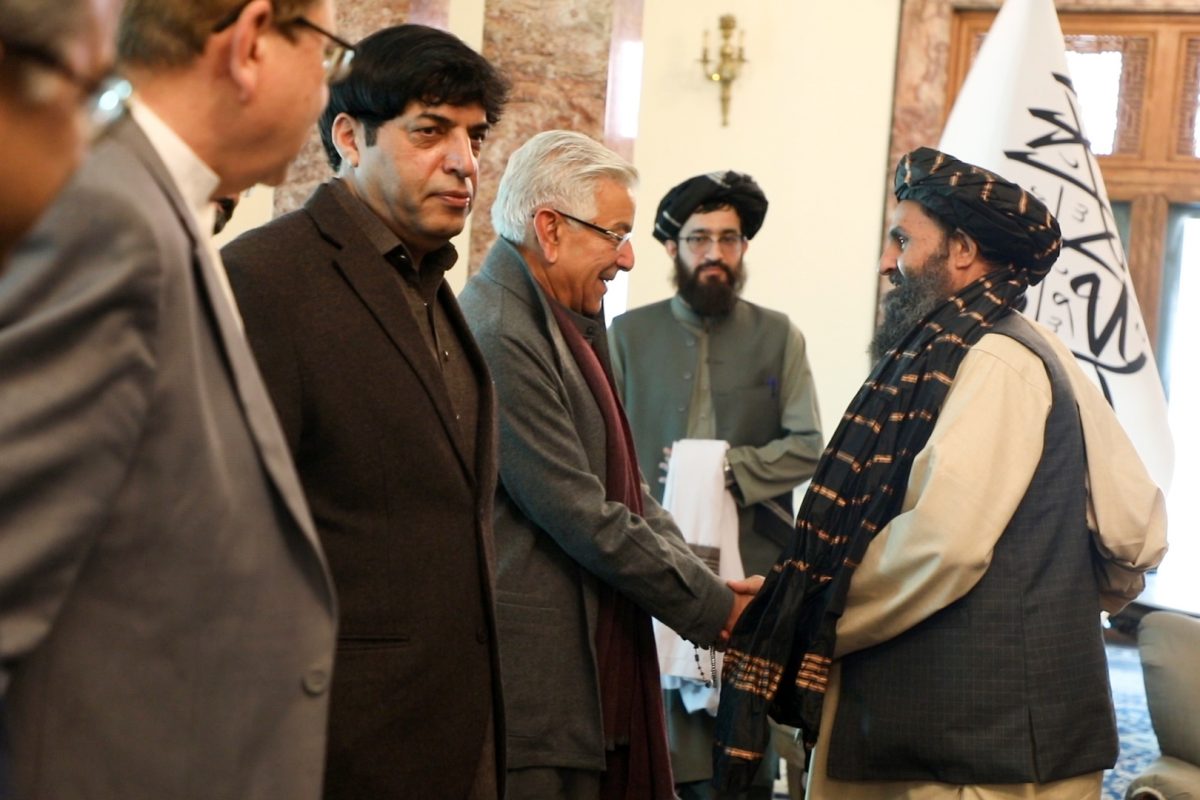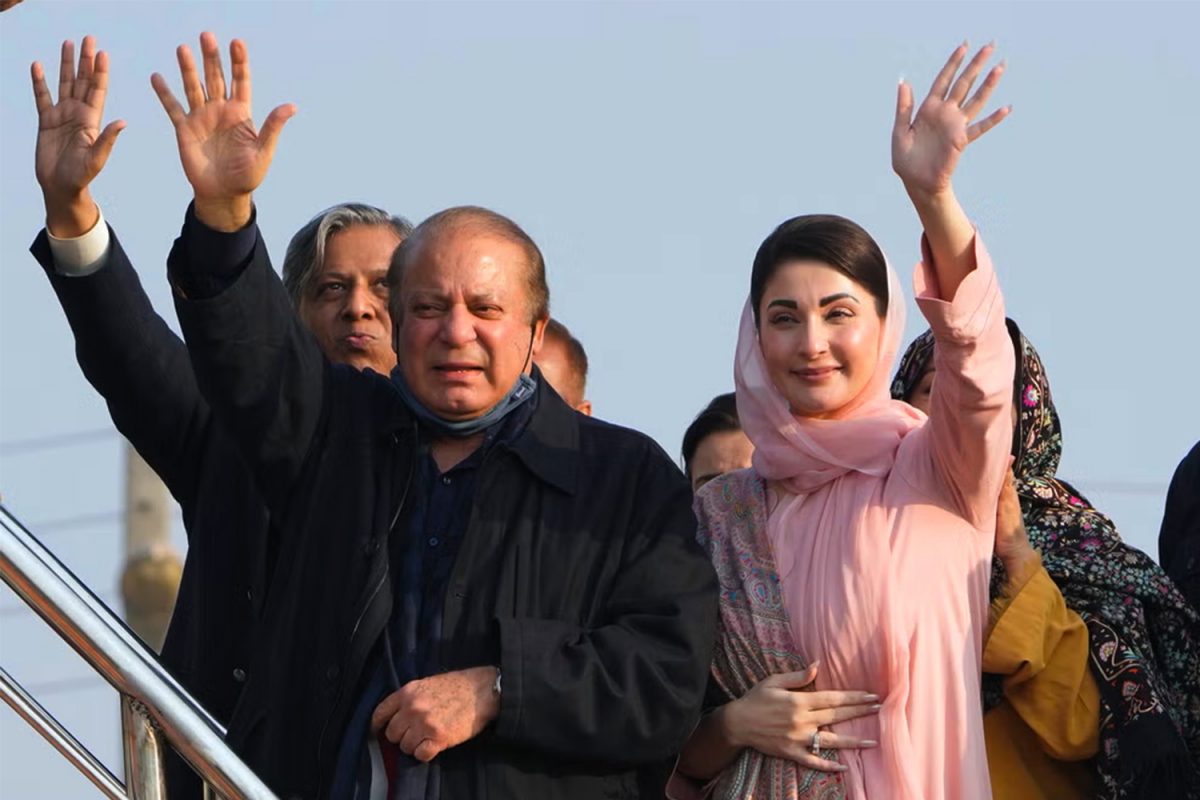
By Bilal Khan
In citing the occurrence of electoral rigging during the May 2013 elections (won by Nawaz Sharif), Imran Khan and a  coalition consisting of his party, Tehreek-e-Insaaf (PTI), and Tahir ul-Qadri is leading a now month-long protest against the federal government in the country’s capital, Islamabad. Although Imran Khan did not succeed in gathering his goal of a million Pakistanis, he did generate enough momentum to cause some political unrest.[1] As it stands however, it does not seem like Nawaz Sharif will cater to Khan’s demand for a resignation nor fresh elections under a reformed electoral process.[2] For reference, Nawaz Sharif and the PML-N won by a landslide with 166 out of the 342 seats in the National Assembly. His victory was also the first instance of an electoral transfer of power in Pakistan’s history.
coalition consisting of his party, Tehreek-e-Insaaf (PTI), and Tahir ul-Qadri is leading a now month-long protest against the federal government in the country’s capital, Islamabad. Although Imran Khan did not succeed in gathering his goal of a million Pakistanis, he did generate enough momentum to cause some political unrest.[1] As it stands however, it does not seem like Nawaz Sharif will cater to Khan’s demand for a resignation nor fresh elections under a reformed electoral process.[2] For reference, Nawaz Sharif and the PML-N won by a landslide with 166 out of the 342 seats in the National Assembly. His victory was also the first instance of an electoral transfer of power in Pakistan’s history.
Moreover, any talk of a military coup or other overt military intervention is greatly premature as Raheel Sharif, the Chief of Army Staff, looks to maintain his predecessor Kayani’s policy of not pulling the Army leadership into the formal political process. However, that is not to suggest that the Army leadership is not a vital political actor in Pakistan’s current political and governing arrangement.
One of the oft-cited misperceptions about Pakistan’s current political realities is the apparent ‘retreat’ of the Army leadership from power. This could not be further from the truth. While the Army leadership did step away from assuming formal power (as was the case under past dictators), it is still the decisive political agent within the country. One need only reflect on the North Waziristan Campaign. Despite Nawaz’s promises for talks and attempts at engaging the Taliban (though half-hearted), the military engaged in regular air strikes and other attacks on the Taliban, thereby signalling its disregard for civilian authority. Secondly, the core strategic objectives of the North Waziristan Campaign, i.e. to completely scuttle the Taliban (of all affiliations, Pakistani or otherwise) were devised by the Army leadership.[3] If Nawaz Sharif was truly in power, then what business does the Army leadership have in deciding the fate of the Taliban during the period of Nawaz’s so-called negotiations?
With the Army leadership’s influence in mind, it should be no surprise that it is playing a relatively major role in trying to diffuse the current unrest. For example, Raheel Sharif has openly called upon the coalition and the government to negotiate a settlement.[4] Considering the Army’s supposed retreat from politics, its leadership issuing direct statements is interesting. Of course, despite allowing the protests to occur (e.g. the Army made it easier for the protestors to encroach on parliament by removing the barriers around the area’s Red Zone[5]), it may be uneasy about the rising instability.
Thus far, the bulk of the Army’s actions have been for the benefit of the US and the latter’s effort to cement a permanent presence in the region. Besides doing away with the Taliban in general (not just those targeting Pakistan), the current operations in Waziristan are taking a toll on the country’s economy and the military’s budget (i.e. taking away from programs focused on external threats, such as India). The unfolding situation surrounding the internally displaced persons (IDP) or homegrown refugees resulting from the campaign is another crisis, though it has taken a back-seat, thanks in no small part to the political unrest in Islamabad. Nonetheless, political instability is a risk for the Army leadership, and by extension, Washington.
America’s interference in the unrest is noteworthy. Despite supporting Sisi’s coup in Egypt, the US Ambassador to Pakistan, Richard Olson, demanded that Nawaz Sharif’s government not be removed by extra-constitutional means (which in this case is opposition protests). The timing could not have benefitted Imran Khan better, who in turn responded by saying, “You like only those governments in Muslim countries that are your slaves.”[6] Although the statement did serve as ‘political ammunition’ for Imran Khan, one must take note of Washington’s willingness to brazenly interfere in Pakistan’s domestic issues (in support of Nawaz or otherwise).
As for Imran Khan, the momentum driving him and Tahir ul-Qadri is the people’s general dissatisfaction with the status-quo. In fact, the reality that the call for removing the government in such a manner is this popular, even though it is considered unconstitutional, is telling. In essence, the Pakistani people want real change, and they are willing to see it through using means that are not afforded to them by the constitution. However, the goal of the coalition is not to instigate fundamental change, i.e. change the system, but to merely remove Nawaz Sharif and the PML-N from power.
Even if by some longshot Imran Khan’s demands were accepted and he is able to win in renewed elections, he will not wield absolute authority on all matters of policy, the Army leadership will limit him, thus continuing the current ineffectual governing system. If at any moment Imran Khan is deemed a threat to this arrangement, he would not be allowed to wield any substantive power. However, if at any stage of this unrest attention were to steer towards the Army’s silent hold on power, then the situation in Pakistan could unravel greatly. Putting a damper on the current unrest will be necessary in order to mitigate that risk, hence the Raheel Sharif’s call for calm.
[1] http://thediplomat.com/2014/08/how-pakistans-military-benefits-from-civilian-unrest/
[2] http://www.aljazeera.com/news/asia/2014/08/pakistan-assembly-rejects-opposition-demands-201482181929195251.html
[3] http://www.defensenews.com/apps/pbcs.dll/article?AID=2014306170047
[4] http://www.usnews.com/news/world/articles/2014/08/20/jubilation-as-pakistan-protests-reach-parliament
[5] http://www.usnews.com/news/world/articles/2014/08/20/jubilation-as-pakistan-protests-reach-parliament
[6] http://online.wsj.com/articles/pakistan-protest-leader-lashes-out-at-u-s-1408641901





3 comments
safina
28th August 2014 at 9:23 am
You fail to mention the 21government officials involved in the brutality that occurred in model town lahore on 17 june 2014, in which police opened fire on the command of chief minister Shabaz sharif, killing 14 and injuring over 90. Recently lahore high court ruled for an FIR to be registered against them. Alarmingly two months later not even that right has been given to victims.
Also you dont mention the recent confessions of high officials of the election commission giving statements that election was 100% rigged.
Also insinuating the army of Pakistan is acting in the interests of US is unfair. It is the Sharif government that is the slave of US.
Bilal Khan
2nd September 2014 at 4:35 pm
Being critical of Imran Khan doesn’t make one a supporter of Nawaz Sharif (or Zardari or JI, etc). You’ll find no disagreement on my end over the Sharif government’s oppression and corruption. Ditto over the elections being rigged.
The problem at heart is the reality that Imran Khan isn’t in the business of changing the system in Pakistan, the very system that makes it possible for the likes of Nawaz, Zardari, MQM, etc, to wield power in the country. Having Nawaz Sharif leave today isn’t going to solve the root problem.
And yes, the Army *leadership* is acting in the interests of the U.S. Never mind the fact that the U.S doesn’t give aid to those who don’t act in its interests, how is it that every major course of action the Pak Army has taken since 2001 somehow managed to benefit the U.S?
1. The U.S occupation of Afghanistan.
2. The gradual decline of spending in the military service arms oriented towards safeguarding Pakistan against external threats.
3. The fighting in Waziristan against the Taliban, including the elements fighting the U.S in Afghanistan (e.g. Haqqani network).
Yasir
9th September 2014 at 6:11 pm
Mere changing faces we cant bring forth instability in country. Very informative article may Allah reward
Khair